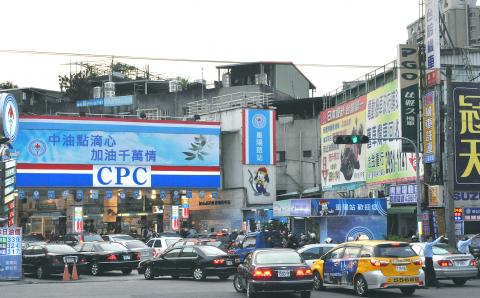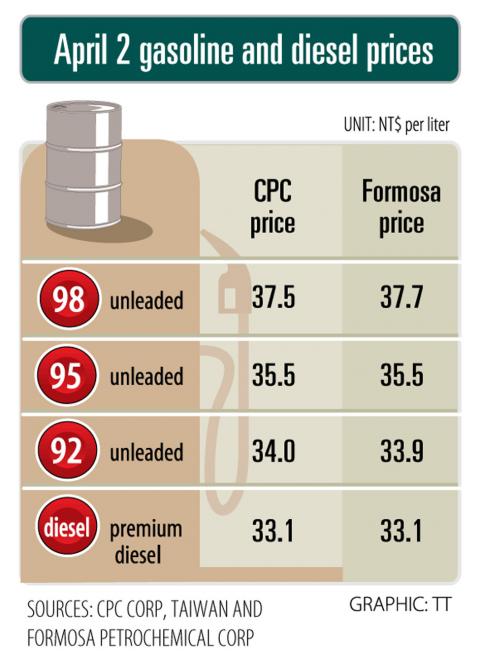Customers rushed to line up at gas stations nationwide yesterday as news broke that the Ministry of Economic Affairs had scrapped restrictions on fuel price increases, allowing state-run oil refiner CPC Corp, Taiwan (CPC, 台灣中油) to pass higher crude costs on to consumers.
Starting today, gasoline and diesel prices will rise between NT$2.3 a liter and NT$3.6 a liter, or an average of 10.7 percent, the steepest pace in nearly four years.
Minister of Economic Affairs Shih Yen-shiang (施顏祥) said the price hike reflects the soaring cost of crude oil and is aimed at keeping CPC’s finances from deteriorating,

Photo: Tsai Pai-ling, Taipei Times
“It was not an easy decision, but no country that heavily depends on oil imports can afford to subsidize oil consumption for an extended period of time,” Shih told a news conference, adding that Taiwan imports 99.4 percent of its oil supply.
Formosa Petrochemical Corp (台塑石化), the nation’s only private-run oil refiner, yesterday said it would increase its gasoline prices between NT$2.2 a liter and NT$3.7 a liter, while the price of diesel will rise by NT$3.2 a liter.
Since December 2010, the government has been subsidizing the nation’s oil products in an attempt to stabilize consumer costs by covering half of any necessary price increases.

With the subsidy in place, domestic oil and diesel prices rose 8 percent and 11 percent respectively during the past 16 months, Shih said. However, during that same period international crude prices surged 43 percent, Shih added.
Consequently, CPC incurred NT$36.1 billion (US$1.22 billion) in net losses last year and an additional NT$12.5 billion in losses in the first two months of this year, Shih said.
Energy Bureau Director-General Jerry Ou (歐嘉瑞) said the policy adjustment would allow CPC to recover only 60 percent of its cost burdens.
CPC will collect the remaining 40 percent in a progressive fashion by only passing on half of any price cuts — based on a floating price mechanism — should crude prices decline, Ou said, adding that the mechanism would remain in place until past distortions have been fully recouped.
The fuel price hikes would detract 0.22 percentage points from Taiwan’s GDP growth this year, forecast at 3.85 percent, and push up consumer prices by 0.37 percentage points, Ou said.
Hsu Chih-chiang (徐之強), an economics professor at National Central University, said the nation’s economy might weaken further if international oil prices continue rising.
“An annual 10 percent hike [in crude prices] could dent the nation’s GDP growth by 0.5 percent,” Hsu said by telephone.
However, the impact might not be evident for three to six months, as retailers tend to initially absorb extra costs to avoid damaging their businesses immediately, the professor said.
The government had no choice but to pass on the price increases to consumers, Hsu said.
However, the increasing costs will help lower demand for oil and encourage the development and sales of energy-efficient cars, home appliances and other products, which is positive for the environment, Hsu added.
According to Ou, car drivers will have to pay on average NT$700 more on fuel a month, while other motorists will spend an extra NT$40.
As of today, CPC’s 92-octane unleaded gasoline prices will rise from NT$31.7 to NT$34 a liter, while 95-octane unleaded will increase from NT$32.4 to NT$35.5 and 98-octane from NT$33.9 to NT$37.5, Ou said.
Meanwhile, the price of CPC’s diesel will climb from NT$29.9 to NT$33.1 per liter, he said.
“The price increases are uneven, so owners of expensive cars will take on more of the burden,” Ou said.
To ease the impact on public transportation, the ministry raised its bus subsidy from the current NT$2.4 a liter to NT$5 a liter, while the taxi subsidy will go from NT$2 to NT$5 per liter with a quota of 450 liters a month, Ou said.
Meanwhile, the ministry will maintain its price increase restriction on liquefied petroleum gas, given the heavy dependence of small food stores and low-income households on the fuel product, Ou said.
In terms of industry, cement, textile and dye companies will be the hardest hit and the government will help work with them to cut oil consumption, Shih said.
Overall, the price hikes will add 0.1 percent to manufacturing costs, the minister said.
Shih also confirmed that the ministry is assessing the possibility of raising utility rates, but he added that it might not reach a conclusion in the short term.
The minister promised to review CPC’s oil procurement and personnel compensation policies, and deliver a report in three months, in reply to challenges over the need for price hikes.
Crude oil costs account for 85 percent of total CPC spending, while personnel outlays make up a modest 2.2 percent, CPC chairman Chu Shao-hua (朱少華) said. He expects crude oil to trade at an average of US$120 a barrel this year.

AIR SUPPORT: The Ministry of National Defense thanked the US for the delivery, adding that it was an indicator of the White House’s commitment to the Taiwan Relations Act Deputy Minister of National Defense Po Horng-huei (柏鴻輝) and Representative to the US Alexander Yui on Friday attended a delivery ceremony for the first of Taiwan’s long-awaited 66 F-16C/D Block 70 jets at a Lockheed Martin Corp factory in Greenville, South Carolina. “We are so proud to be the global home of the F-16 and to support Taiwan’s air defense capabilities,” US Representative William Timmons wrote on X, alongside a photograph of Taiwanese and US officials at the event. The F-16C/D Block 70 jets Taiwan ordered have the same capabilities as aircraft that had been upgraded to F-16Vs. The batch of Lockheed Martin

GRIDLOCK: The National Fire Agency’s Special Search and Rescue team is on standby to travel to the countries to help out with the rescue effort A powerful earthquake rocked Myanmar and neighboring Thailand yesterday, killing at least three people in Bangkok and burying dozens when a high-rise building under construction collapsed. Footage shared on social media from Myanmar’s second-largest city showed widespread destruction, raising fears that many were trapped under the rubble or killed. The magnitude 7.7 earthquake, with an epicenter near Mandalay in Myanmar, struck at midday and was followed by a strong magnitude 6.4 aftershock. The extent of death, injury and destruction — especially in Myanmar, which is embroiled in a civil war and where information is tightly controlled at the best of times —

Taiwan was ranked the fourth-safest country in the world with a score of 82.9, trailing only Andorra, the United Arab Emirates and Qatar in Numbeo’s Safety Index by Country report. Taiwan’s score improved by 0.1 points compared with last year’s mid-year report, which had Taiwan fourth with a score of 82.8. However, both scores were lower than in last year’s first review, when Taiwan scored 83.3, and are a long way from when Taiwan was named the second-safest country in the world in 2021, scoring 84.8. Taiwan ranked higher than Singapore in ninth with a score of 77.4 and Japan in 10th with

SECURITY RISK: If there is a conflict between China and Taiwan, ‘there would likely be significant consequences to global economic and security interests,’ it said China remains the top military and cyber threat to the US and continues to make progress on capabilities to seize Taiwan, a report by US intelligence agencies said on Tuesday. The report provides an overview of the “collective insights” of top US intelligence agencies about the security threats to the US posed by foreign nations and criminal organizations. In its Annual Threat Assessment, the agencies divided threats facing the US into two broad categories, “nonstate transnational criminals and terrorists” and “major state actors,” with China, Russia, Iran and North Korea named. Of those countries, “China presents the most comprehensive and robust military threat